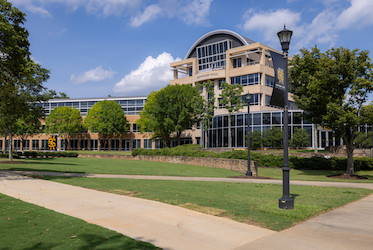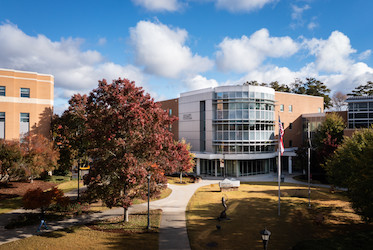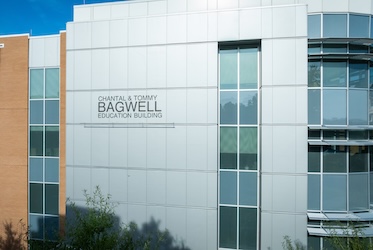
Kennesaw State receives $2.5 million U.S. Department of Education grant to boost bilingual and multilingual educator workforce
KENNESAW, Ga. | Oct 2, 2024
The fact Georgia has the eighth highest number of multilingual students in the country has led three Kennesaw State University researchers to work toward increasing the number of teachers who speak two or more languages.
Kennesaw State’s Teaching English to Speakers of Other Languages (TESOL) program in the Bagwell College of Education was awarded more than $2.5 million over the next five years by the U.S. Department of Education to assist in the recruitment and retention efforts of bilingual and multilingual teachers in Georgia.
There are 1.06 million Georgians whose primary language is something other than English, according to the U.S. Census. The most commonly spoken languages besides English are Spanish, followed by languages spoken in Asia and Pacific Island nations.
Jayoung Choi (Principal Investigator, PI), professor of TESOL in KSU’s Bagwell College of Education, Tuba Angay-Crowder (Co-PI and Project Manager), a postdoctoral researcher, and Zurisaray Espinosa (Co-PI), clinical assistant professor of TESOL, are heading a program set to tackle a growing shortage of English to Speakers of Other Languages (ESOL) teachers. The three researchers are multilinguals with an immigrant background, instilling in them the importance of their current work.
“It is important to have bilingual or multilingual teachers, especially in Georgia where we have a diverse student population from so many various linguistic backgrounds,” said Choi. “Schools in Georgia, similar to other parts of the U.S., are experiencing a significant shortage of qualified ESOL teachers.”
The grant is part of the National Professional Development program’s $7.5 million in funding and will support KSU’s Grow Your Own TESOL program over the next five years. The project aims to recruit and train 160 bilingual and multilingual teacher candidates over that time.
There are three pathways within the Grow Your Own program: A master’s degree in teaching, a graduate-level certification program, as well as undergraduate-level TESOL courses.
These pathways aim to attract bilingual teacher aides, or even high school students from within local communities to become certified educators, researchers said.
“Our project helps teacher candidates by providing financial and academic support through tuition assistance, mentoring, and coursework,” Angay-Crowder said. “It also acknowledges the importance of community-based teacher recruitment, encouraging people who are already familiar with local linguistic and cultural dynamics to enter the teaching profession. Alternative certification pathways offer flexible and accelerated routes to teacher certification, specifically targeting individuals who may already hold degrees, but lack formal teacher training.”
For people who complete the Grow Your Own program, they receive continuing support through mentorship, continuous professional development, and more. But the overall goal of each pathway is to recruit, train, support, and retain bilingual educators, while ensuring they have the skills and qualifications to teach English learners effectively.
All three professors hope that each teacher candidate who completes the program stays, but for the project to be seen as a success, 80% will complete their programs.
“Success will also be evaluated by the program’s ability to retain candidates,” Espinosa said.
By the end of the five-year project, the three aim to have recruited 80 candidates for the Master of Arts in Teaching licensure. The second pathway open for non-degree programs is seeking 40 candidates while the last pathway on the undergraduate-level TESOL courses is looking for 40 candidates as well.
“So in addition to language instruction, bilingual or multilingual teachers also serve as important role models,” Choi said. “So they show students from similar backgrounds that it is possible to succeed academically while maintaining one's cultural identity, which is something I speak to a lot with my own students. This representation is powerful and can inspire a lot of students to pursue their own academic goals, or even, careers in education.”
The first students will enter the program next summer.
The contents of this publication were developed under a grant from the Department of Education. However, those contents do not necessarily represent the policy of the Department of Education, and you should not assume endorsement by the Federal Government.
Related Stories

Kennesaw State's online degree programs nationally ranked by U.S. News

Kennesaw State, Georgia Leadership Institute for School Improvement partnership will expedite career advancement for educators

Kennesaw State education program included in funding for school system grants

Kennesaw State partners with Marietta City Schools to deliver new dual-certification master's program
A leader in innovative teaching and learning, Kennesaw State University offers undergraduate, graduate and doctoral degrees to its more than 47,000 students. Kennesaw State is a member of the University System of Georgia with 11 academic colleges. The university’s vibrant campus culture, diverse population, strong global ties and entrepreneurial spirit draw students from throughout the country and the world. Kennesaw State is a Carnegie-designated doctoral research institution (R2), placing it among an elite group of only 7 percent of U.S. colleges and universities with an R1 or R2 status. For more information, visit kennesaw.edu.














